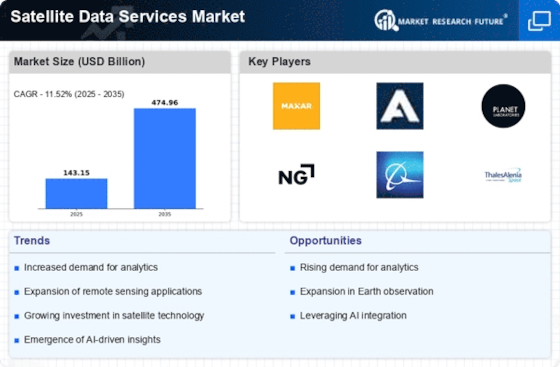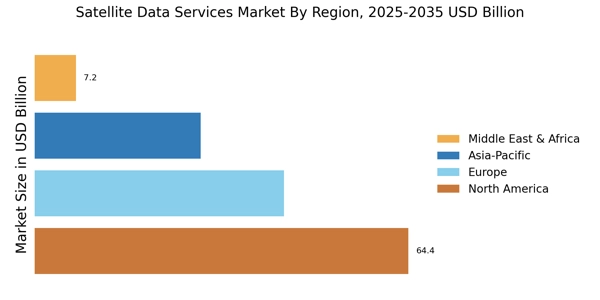Growing Demand for Real-Time Data
The Satellite Data Services Market is experiencing a notable surge in demand for real-time data analytics. Industries such as agriculture, transportation, and disaster management increasingly rely on timely information to make informed decisions. For instance, the agricultural sector utilizes satellite data to monitor crop health and optimize yields, while transportation companies leverage this data for route optimization and fleet management. According to recent estimates, the market for real-time satellite data services is projected to grow at a compound annual growth rate of approximately 15% over the next five years. This trend indicates a robust appetite for immediate insights, driving innovation and investment in satellite technologies.
Growing Awareness of Climate Change
The Satellite Data Services Market is increasingly influenced by the growing awareness of climate change and environmental issues. Satellite data plays a crucial role in monitoring climate patterns, deforestation, and natural disasters. Organizations and governments are leveraging this data to develop strategies for climate adaptation and mitigation. The market for environmental monitoring services, which heavily relies on satellite data, is projected to expand significantly, with estimates suggesting a growth rate of approximately 12% annually. This heightened focus on sustainability and environmental stewardship is likely to drive demand for satellite data services, as stakeholders seek reliable data to inform their initiatives.
Advancements in Satellite Technology
Technological advancements in satellite systems are significantly influencing the Satellite Data Services Market. Innovations such as miniaturization of satellites, enhanced imaging capabilities, and improved data transmission methods are expanding the scope of satellite applications. For example, the deployment of small satellites, or CubeSats, has made it feasible to gather high-resolution data at lower costs. This evolution is expected to increase the number of satellites in orbit, thereby enhancing data availability and quality. As a result, the market is anticipated to witness a growth trajectory, with projections indicating a potential increase in market size by over 20% in the coming years.
Rising Need for Geospatial Intelligence
The Satellite Data Services Market is witnessing a heightened need for geospatial intelligence across various sectors. Governments and private organizations are increasingly utilizing satellite data for urban planning, infrastructure development, and environmental monitoring. The integration of geospatial data into decision-making processes is becoming essential for effective resource management. Reports suggest that the geospatial analytics market, which heavily relies on satellite data, is expected to reach a valuation of over 100 billion by 2026. This growing emphasis on data-driven strategies is likely to propel the demand for satellite data services, fostering a more informed approach to planning and development.
Increased Investment in Space Infrastructure
Investment in space infrastructure is a critical driver for the Satellite Data Services Market. Governments and private entities are allocating substantial resources to enhance satellite capabilities and expand networks. Initiatives such as public-private partnerships are emerging to facilitate the development of advanced satellite systems. For instance, the establishment of new satellite constellations aims to provide global coverage and improve data accessibility. This influx of capital is expected to stimulate innovation and competition within the market, potentially leading to a market growth rate of around 18% over the next few years. Such investments are pivotal in shaping the future landscape of satellite data services.

















